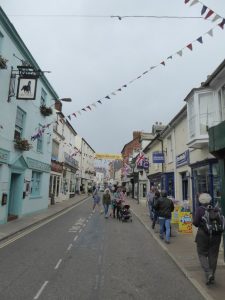“As shops reopen, small businesses can make a lasting impression on new and old consumers by wooing them with intentional engagement and authentic relationships.”
“The retail property boom is now over. Many of our town centres will have to find a new purpose.”
.
There’s been a lot of interest in the ‘experience economy’ as the way ahead.
Here in Sidmouth, it fits very well with the growth in working from home and creativity on the coast:
Digital and creative now dominate the economy – Vision Group for Sidmouth
And there are all sorts of new ideas around ‘eco/responsible tourism’ too:
Sustainable tourism and ‘voluntourism’ – Vision Group for Sidmouth
Although we shouldn’t be putting all our eggs in the one hospitality basket:
Is our local economy is dangerously over-exposed to tourism? – Vision Group for Sidmouth
Do we really want to ‘go back to normal’? 2: the hospitality industry – Vision Group for Sidmouth
On the other hand, Sidmouth is a growing ‘festival town’:
2017 Making Sidmouth a Festival town – Vision Group for Sidmouth
.
Last month, Emma Simpson looked at how the experience economy could help the high street:
.

The experiences replacing closed High Street stores
Landsec boss Mark Allan thinks a quarter of what is currently retail space will need to be turned into something else. “For me, it’s really difficult to think of an example where you have 25% of something that it exists in the UK that is no longer required. And so you’re not going to solve that sort of a problem by tinkering around the edges,” he says.
The pain won’t be evenly spread either, says Mr Allan: “Some places are going to be virtually empty and they are not going to survive as retail in any shape or form. Some are going to be absolutely fine – rents are lower, sales are lower and they’re worth less than they were but fundamentally they’ve got a role to play longer term and some places are going to be in the middle where they are going to survive but they need some investment.”
Some industry experts think the amount of redundant retail space is even higher. So how did we get here? We’ve seen a huge proliferation of shops over the last 40 years. Retail has just been growing and growing, from out of town retail parks and shopping centres to so called clone towns dominated by chains, who were willing to pay higher rents.
That retail property boom is now over. Many of our town centres will have to find a new purpose. We’ve been talking about how to save the High Street for more than a decade but the pandemic has turbo charged the problems now.
Mr Allan says it’s time to act. “Covid has been a tipping point. If we don’t tackle it over the next couple of years together then there’s a real risk some of this redundant retail property sits there for decades empty and that would be a disaster for the communities where that property is located.” And he says there’s no single party that can solve the problem: “This needs people to come together. I think it’s a significant moment and a really big opportunity, particularly for those centres and high streets where there is no future for retail, for radical, bold, thinking. I think it could be exciting.”
The experiences replacing closed High Street stores – BBC News
.
Writing last November on the Forbes website, Victor Ho actually saw small retailers as being essential to the future of the experience economy:
.
Small Business, Big Experience: Why Main Street America Should Bet On The Experience Economy
Because experiences — not chores — is where I believe small businesses shine, the pandemic presents an opportunity for small businesses to reevaluate what experiences matter to their customers and where they can truly outdo their competition. Small businesses can master experiential trips to win customers by focusing on the following three things:
1. Feedback: Small businesses can collect feedback from customers through loyalty platforms, social media polls, analytics from payment databases, direct messaging tools and, of course, in-person conversations.
2. Differentiation: Lean into one area of expertise, focusing on what makes the business unique. Analyzing insights offered through feedback tools is vital to understanding your strengths and capitalizing on the unique experiences and offerings customers actually value.
3. Personalization: Research shows 40% of consumers are likely to buy more from retailers that personalize their shopping experience. Customers don’t want to feel like a part of a crowd; they want to feel as though your business is there to serve their specific needs. Giving customers rewards from loyalty programs is a great way to make them feel seen and heard, and encourage regular customers to return. One-on-one consultations or virtual appointments are also effective.
As we think about our post-pandemic world and what’s in store for the future of retail, it’s important to consider that, from my perspective, the demand for retail experiences is still strong, only repressed due to safety concerns and regulations. The core shift in consumer spend on experiences has not ended. I believe it’s simply paused, and the dip is temporary. I am confident there will be a thriving economy of Main Street America in the near future.
A recent report by SAP found that 53% of top-performing small and medium-sized businesses consider the quality of their customer experience as their top strategic priority for the next three years. As shops reopen, small businesses can make a lasting impression on new and old consumers by wooing them with intentional engagement and authentic relationships.
Small Business, Big Experience: Why Main Street America Should Bet On The Experience Economy